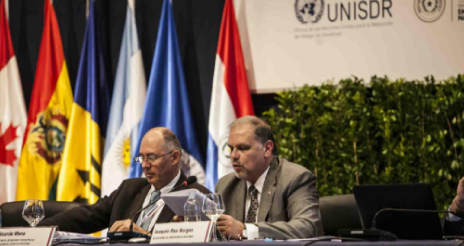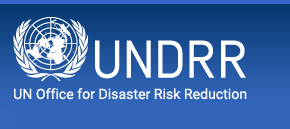- Our Mandate
- Mission and Objectives
- UNDRR in the UN
- Work Programme & Annual Reports
- Results Based System
- Work Partnerships
- Headquarters - Geneva
- SG-UN representatives for DRR
- Regional Office – The Americas and the Caribbean
- Head of the Regional Office – The Americas and the Caribbean
- What is Disaster Risk Reduction?
- What is the International Strategy?
- History of UNDRR
Governments of the Americas adopted "Declaration of Asuncion" to guide the implementation of the Sendai Framework in the Americas

Ricardo Mena, UNDRR, and Joaquín Roa, SEN, during the closing ceremony of the Ministerial Meeting. Photo Cred: Marcelo Encina.
By: UNDRR – The Américas
ASUNCION, Paraguay, Thursday June 9, 2016 - Ministers and High Level Authorities of Member States of the United Nations in the Americas, today adopted the "Declaration of Asuncion" containing the priority agenda and guidelines of a Regional Action Plan for the implementation of the Sendai Framework for Disaster Risk Reduction 2015-30 in the region.
The Declaration calls on governments to, according to national capacities, protect people, communities and countries, their livelihoods, their health, their cultural heritage, social and economic assets and their ecosystems; through the promotion and integration of an approach to manage disaster risk reduction policies and national and sub national programs, thus ensuring the sustainability of achievements in development.
Among other key issues for achieving sustainable development in the region, the document also recognized the need for the governments of the Americas, together with other relevant actors in accordance with their respective mandates, encourage the diffusion at regional level, national, sub national and local, regional and national strategies properly harmonized with the Framework Sendai and prioritize their implementation transversal, with respect to national legislation.
It is expected that the Regional Action Plan for the implementation of the Sendai Framework will be approved during the next session of the Regional Platform for Disaster Risk Reduction of the Americas (# PR17) to be held in Canada next year, with contributions from governments, civil society, private sector, academia and scientific and organized groups.
The "Declaration of Asuncion" was presented by the Minister Joaquín Roa, of the National Emergency Secretariat of the Presidency of the Republic of Paraguay (SEN), during the closing ceremony of the First Meeting of Ministers and High Level Authorities on the Implementation of the Sendai Framework for Disaster Risk Reduction 2015-2030 in the Americas, which opened yesterday by His Excellency the President of the Republic of Paraguay, Don Horacio Cartes Jara and was attended by the Special Representative of the Secretary-General of the United Nations Robert Glasser, as well as more than 170 high-level representatives of governments of 35 countries, officials of the United Nations system and strategic partners.
Background
Since the adoption of the Hyogo Framework for Action in 2005, and as documented in the national and regional reports on the progress achieved towards implementation and in other global reports, the countries and other relevant actors have advanced disaster risk reduction at the local, national and regional level, which has contributed to the decline in mortality in the case of certain hazards.
However, in the same ten-year period since its adoption, more than 700,000 people lost their lives worldwide, more than 1.4 million were injured and around 23 million were left homeless as a result of disasters. In addition, in 2015, an update of damage and loss databases for the period 1990-2014 for 22 countries in Latin America and the Caribbean showed that losses from destruction and damage to homes, as well as people affected by disasters in the Americas, are growing over time and expanding geographically.
The increase in losses that has been observed in the region as a whole and in individual countries has mainly been associated with extensive risks triggered primarily by hydro-meteorological and climatic phenomena. In the region, for each intensive event, there were 177 extensive events, which viewed cumulatively, contributed more than half of the loss of life (22,424), 90% of the persons affected (115 million) and 88% of the homes damaged (5.5 million).
The data and information on disaster trends in the region serve to reaffirm the fact that although progress has been made in recent years to move towards disaster risk reduction, the region of the Americas continues to be one of the most vulnerable to natural hazards and includes, among its main gaps, the need to integrate disaster reduction in the development planning process and the associated sectoral efforts.
Disaster risk reduction and progress towards its implementation is one of the biggest challenges for the region. It will only be possible if governments, civil society and the private sector integrate disaster reduction as a key element in their development planning and investment.
To address the vulnerability in the Americas, a joint effort is therefore necessary, based on the analysis made by countries in the Sendai Framework for Disaster Risk Reduction, to define a roadmap to advance the implementation of the priorities identified therein.
It is in this regard that the National Emergency Secretariat of Paraguay (SNE), responding to this concern, together with the United Nations Office for Disaster Risk Reduction (UNDRR) - Regional Office for the Americas, considered it necessary to continue promoting the dialogue initiated in Sendai by countries, through a discussion by high-level ministerial representatives.
This ministerial discussion strengthened policy decisions at the country level needed to facilitate the establishment of a regional action plan for the implementation of the Sendai Framework in the Americas.
Related Links:
Follow the UNDRR news online:
 Now we have twitter account @UNDRR Américas y el Caribe
Now we have twitter account @UNDRR Américas y el Caribe
JOIN US!
Tweets por el @UNDRR Américas y el Caribe
